Security key to solving soaring South Sudan displacement
Security key to solving soaring South Sudan displacement

BENTIU, South Sudan – After fighting broke out in his hometown in South Sudan’s Unity State, trainee medical technician James Koat fled to a protection site in Bentiu for temporary respite. Three years later he is still here, too afraid to go home.
“I told my family that I had to escape and get them something to eat, but once I came here I’ve never gone back," he said. "Here I am safe."
The site where he sought refuge is now the largest in South Sudan, hosting more than 120,000 men, women and children like him, fleeing violence and growing hunger with more arriving every day.
“I am afraid to go back because there is not enough security, enough protection.”
"Look around us here today, in South Sudan, when you ask them 'why are you not in your homes, why have you been away from your homes?' the first word that will always come is 'fear’," UN High Commissioner for Refugees Filippo Grandi said during a weekend visit to the site.
"'I am afraid to go back because there is not enough security, enough protection.'”
A report published today by UNHCR, the UN Refugee Agency, found that there were 65.6 million people forcibly displaced worldwide at the end of 2016, the highest number since UNHCR was founded in 1950.
The biggest new factor last year was South Sudan, the world's youngest country where the disastrous breakdown of peace efforts last July contributed to the outflow of 739,900 people by the end of the year. As the conflict and hunger grew, that number has soared to 1.87 million today.
"If there is no security, there is no point," Grandi said, after meeting and talking to displaced families at the protection of civilians site about their needs. "The theme of security is very prevailing here."
“I’m grateful because my children and I are safe and will have a house and good place to sleep."
With violence raging on the outside, and massive overcrowding in the site, UNHCR and humanitarian partners are struggling to provide basic needs such as water, food and medical care.
While in Bentiu, the High Commissioner also visited a new site where hundreds of displaced people have been given small plots of land to build more permanent shelters, as well as supply kits that include solar lamps, cooking supplies and soap.
Among displaced people living there is Anjelina, who fled her home with her three children two years ago, first settling in one of the protection sites. Two weeks ago, she and her children moved to this new site. She said she was feeling hopeful for the first time in years.
“I’m grateful because my children and I are safe and will have a house and good place to sleep,” she said.
There are plans to expand the programme and open similar sites throughout the country to give assistance and hope to millions of displaced people, although both hope and cash are in short supply.
“We try in this situation to provide them not only with the basics of life, but a sense of the future,” said the High Commissioner. “This is what is missing the most. Not only for the refugees and displaced from South Sudan, but for the nearly 66 million displaced around the world.”
“We try in this situation to provide them not only with the basics of life, but a sense of the future.”
Before the war, James was studying to become a lab technician, but like millions of others, the conflict has put his life and dreams on hold.
“I want to see peace in South Sudan so people can go back to normal life, can go back to school and go back to their normal economic activities,” he said.
Grandi, who is in the African country on a three-day visit that has also taken him to the capital, Juba, said that while assistance was urgently needed now, peace was the only lasting solution for the millions displaced from South Sudan and all the world’s largest conflicts.
“We need to become able to make peace again,” he said. “Wherever I’ve been, this is the cry of people: 'we want peace, we want peace.'”
Grandi plans to make a strong appeal for an increase in peace efforts at the Solidarity Summit on Refugees in Uganda this week. The summit will bring together about 500 participants, including heads of government, UN and financial institutions, and non-governmental organizations.












